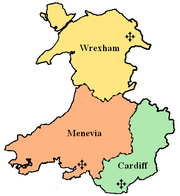|
Roman Catholic Diocese of Menevia
The Diocese of Menevia (Latin: Dioecesis Menevensis) was a Latin Church diocese of the Catholic Church in Wales. It was one of two suffragan dioceses in the ecclesiastical province of Cardiff and was subject to the Archdiocese of Cardiff, until it merged with the archdiocese in 2024, to form the Roman Catholic Archdiocese of Cardiff-Menevia. History The history of the diocese of St Davids is traditionally traced to that saint (Dewi) in the latter half of the 6th century. Records of the history of the diocese before Norman times are very fragmentary, however, consisting of a few chance references in old chronicles, such as Annales Cambriae and Brut y Tywysogion (Rolls Series). On 12 May 1898, the Apostolic Vicariate of Wales was elevated to diocesan status and had its seat at the Cathedral Church of Our Lady of Sorrows in Wrexham [1] until 1987 when the Diocese of Wrexham was created.The Diocese of Menevia covered between 1987 and 2024 the area roughly that of the ancient Diocese of St Davids.[2] ("Menevia" was the Roman name for St Davids.) The Catholic diocese was led by Mark O'Toole, Archbishop of Cardiff,[3] when Cardiff and Menevia merged in a single Archdiocese in 2024. The sixth century bishop St Ismael is honoured on 16 June.[4] Timeline
DetailsIn 2007, there were 27,561 Catholics in the diocese which was served by 34 diocesan priests, 19 religious priests, 9 non-ordained male religious and 100 female religious. There are 34 Catholic educational institutions in the then-diocese,[8] including three secondary schools:
Founded in 1965, St Joseph's School was the first Catholic comprehensive school in Wales.[9] The geographic remit consisted of the City and County of Swansea, Neath and Port Talbot, and the traditional counties of Brecknockshire, Cardiganshire, Carmarthenshire, Pembrokeshire and Radnorshire - an area of 9,310 square kilometres (3,590 sq mi) roughly. The cathedra was located at St Joseph's Cathedral, Swansea. Situated within what was the diocese is the Welsh National Shrine of Our Lady of Cardigan at Cardigan. BishopsOrdinaries
Coadjutor Bishops
Auxiliary Bishop
Other priest of this diocese who became bishop
DeaneriesThere were a total of five deaneries in the Diocese of Menevia, all of which cover several churches in that area, overseen by a dean. The deaneries are: See also
References
External links |
||||||||||||||||||||||||||||||||||||||||||||||||||||||||||||||
Portal di Ensiklopedia Dunia




